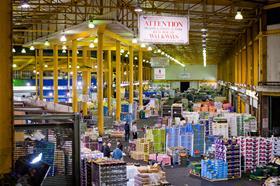
Progress has been made on the bid to move Birmingham’s wholesale market.
Chair of the market tenants' association, Mark Tate, toldFPJ that the market should be up and running in one of two new venues by April 2016, with the figures due to be finalised over the next few months.
A spokesperson for Birmingham City Council, though, said no date had been fixed as yet for the move, and that three options remain on the table for relocating the market from its current home in the city centre.
Speaking after a recent meeting with councillors, Tate said: “It wasn’t quite rubber-stamped exactly – we’ve still got facts and figures to go through, and the devil is in the detail. But the council has given us an indication of service charges and rent charges, and the figures are going to be finalised in January.
“It’s a fantastic step from where we were originally. Back in July 2011, the council was closing the market down and kicking us out with no finance packages, nothing – they were just kicking us out. There wouldn’t be a market in Birmingham, and that was it. Now they’re paying relocation costs, and building us a brand-new market.”
He added: “We were a problem to them, but now we’re part of the solution. It’s all come round, and we’re singing from the same hymn sheet. We’ve just got to get the pounds, shillings and pence right.”
The city council wants to relocate the market from its current 1970s-built home in Pershore Street, Digbeth, because it deems the facility to be out of date and beyond cost-effective repair.
Traders have argued they would prefer to remain in the city centre, but the council has long-term plans to develop the land and extend the city centre outwards.
Deputy council leader Ian Ward, said: “We are in challenging financial times, and the difficult choice is simply that if we want a wholesale market in the city of Birmingham then we need to consider the relocation proposals.
“We have no statutory duty to provide a wholesale market but we recognise that it is important to the local economy and the food supply chain.”
The venue most likely to be the market’s new home is The Hub in Witton – roughly four miles outside the city centre.
Four hundred car-parking spaces, warehousing and waste management facilities could be incorporated alongside a new 190,000 sq ft market if the relocation takes place there, and the council would continue to manage the market but would consider ways in which it can involve the wholesale traders in its management to reduce costs.
The second most likely option for the market’s new home is the site of a former electronics factory in Tyseley at the Signal Point industrial park - a little closer to the city centre, albeit only by about a mile.
The third option, in Washward Heath,is believed to be a “non-runner”, as it has been earmarked for a train depot linked to the UK government’s high-speed rail project.
Tate said: “Some traders are worried moving out of the city will lose them custom – especially the Chinese, as we’re currently right in the middle of the Chinese Quarter. By and large, though, they don’t care really – the only option is to go to Manchester or London, or for us to close down. At least us stopping somewhere, the customer will have somewhere to go.”
As for what happens next, Tate said: “The next thing will be the detail. Driving through the service charges. We need to drive the rent down to make it affordable for every individual company, or else we’ll get there and everyone will get there and can’t afford to operate. They might as well fold up.
“We’ve got 72 companies, and a turnover of £300 million; it affects 40,000 people if you think of jobs in surrounding areas or connected with the market, and the council has realised the effect it has.
“But we’ve got to sort out the relocation charges – phone lines, computer systems, even taking a safe from one place to another – it all adds up. New fridges too, things like that, and all of a sudden, it’s coming to £200,000, or £250,000. We weren’t given any prior warning, so there are no funds allocated to that. We want the council to pay 100 per cent, they want to give us 1 per cent, so the next stage is meeting in the middle.”



